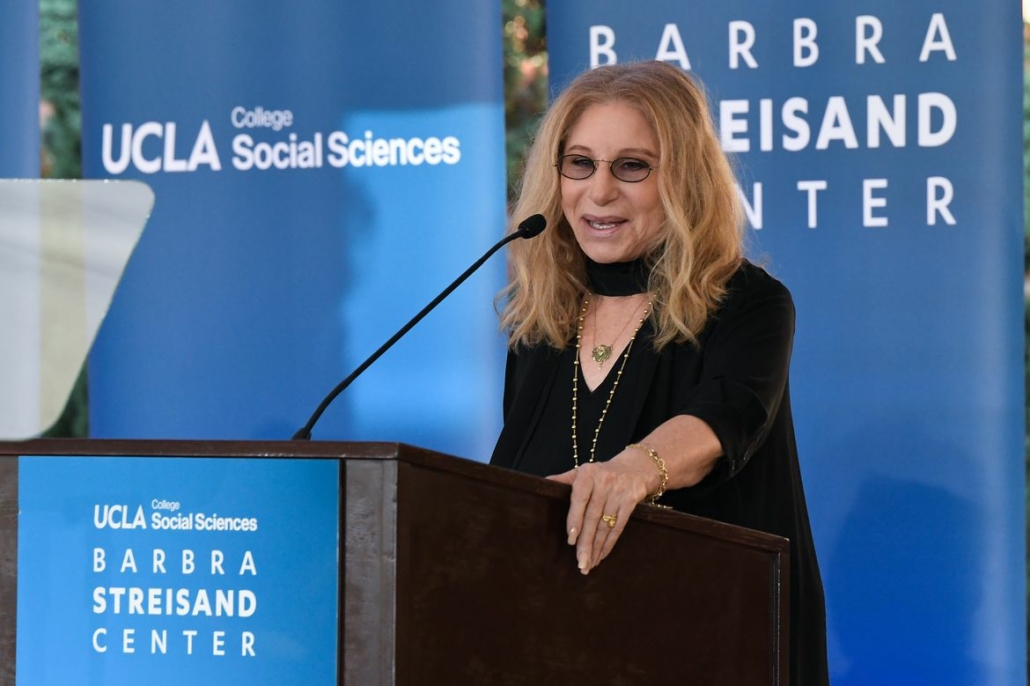UCLA Newsroom: Inaugural UCLA Barbra Streisand Center lecture examines truth in the public sphere

By Jonathan Riggs | View original story on UCLA Newsroom
When the authors of the Declaration of Independence wrote about certain truths they deemed self-evident, they surely understood that much about the United States would change in the centuries to come. What they might not have foreseen, however, was that the very definition of “truth” would be one of those changes.
Yet debates over what constitutes truth have intensified over the past several years and, as panelists at the inaugural UCLA Barbra Streisand Center lecture observed, the consequences have been dire. Barbra Streisand donated funds in 2021 to establish a forward-looking institute at UCLA focused on solving societal challenges via four centers of study. Her funding made Tuesday’s launch of the annual lecture possible, and she personally kicked off the event with remarks that addressed the current American landscape.
“Alternative facts and outright lies have unfortunately become part of everyday political discourse,” Streisand said. “But if we can’t agree on fundamental truths, then the bonds that hold our society together are broken. We are seeing politicians exploit lies, fear and hatred that promote violence. Books are being banned and teachers are forbidden to teach the facts of our history. … The shameless denial of reality leaves me both sad and confused.”
She added that the center bearing her name, and perpetuating that of her late father who revered scholarship, was created to advance research and programming on topics including disinformation, the silencing of minority voices, the responsibilities of journalists and social media discourse.
The event was held Sept. 12 in the UCLA Meyer and Renee Luskin Conference Center. Darnell Hunt, UCLA’s executive vice chancellor and provost, and Abel Valenzuela, interim dean of social sciences, welcomed guests and introduced Streisand and the panelists.
The focus of the meeting was a panel discussion about truth in the public sphere, moderated by Safiya Noble, an internet studies scholar and UCLA professor of gender studies and African American studies who co-founded the UCLA Center for Critical Internet Inquiry and founded the UCLA Center on Race and Digital Justice. The panelists were André Brock, associate professor of media studies at Georgia Tech; Frances Haugen, author of “The Power of One: How I Found the Strength to Tell the Truth and Why I Blew the Whistle on Facebook”; and Stuart Stevens, author of “It Was All a Lie: How the Republican Party Became Donald Trump” and “The Conspiracy to End America: Five Ways My Old Party Is Driving Our Democracy to Autocracy.”
A former Republican strategist who worked for George W. Bush and Mitt Romney, among others, and is now a senior advisor at the Lincoln Project, Stevens spoke about how completely political ideologies have changed in his lifetime.
“The conservative element of the Republican Party was once the most antagonistic to the Soviet Union and Russia, and now it’s the most pro-Putin element,” he said. “This is not a coincidence; the Russians completed the most successful covert operation in history, to successfully influence an American election.”
Brock said race and gender have played major roles in truth becoming a partisan issue in America.
“Donald Trump was able to tap successfully into this idea of making America great again, but great for whom? It’s very valuable to understand who are the people who engage most in these spaces where they can be radicalized,” Brock said. “For some reason, middle-class, white, male, heterosexual, geographically isolated folks seem to be extremely susceptible to disinformation. They feel like they have less in a world where women have sexual agency and the rights to conduct their own business, Blacks have agency where they can get better jobs and education, and so on.”
Haugen, whose exposing of Facebook’s unethical dealings made headlines in 2021, said a major reason disinformation has been able to proliferate online is the outdated policies governing social media — many of which were created before algorithms and artificial intelligence made it easy to target messages to specific users and create online echo chambers. She added that by effectively monopolizing access to the internet in fragile nations, Facebook has stoked flames that have led to ethnic violence in Myanmar and Ethiopia.
But she urged the audience to have hope, even in the face of the massive challenges created by social media, by drawing lessons from history.
“Every time a new communication technology has been invented, the consequences have been disastrous,” Haugen said. “When we invented the printing press, a third of Germany died over the next 100 years, because people were sending out pamphlets on how to know if your neighbor was a witch.
“There was a level of chaos, too, with newspapers and radio and cinema. But every time, we have learned and responded — and even if things have gotten worse first, they have always gotten better. We have to approach this moment with a mindset of having a duty to the future, to act and respond and to demand more, and I have faith that we can.”
Noble concluded the discussion with her own message of hope.
“I can personally attest that UCLA works every single day on these issues around the web and society and all of its ills, and that we will solve these problems together,” she said. “In my own work, I’m so inspired by abolitionists who never imagined that some of us would be on this stage. And yet here we are. It’s very important for all of us to imagine a future we can’t see right now and work toward it.”

